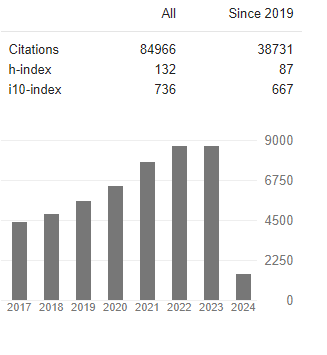In Vitro Proliferation of Petunia Hybrida Vilm; Worldwide Important Ornamental Plant
Abstract
Qudsia Firdous, Farah Khan
This project tries to artificially grow one of the most ornamentally significant Petunia hybrida when it is out of season. Murashige and Skoog Basal Medium (MS Basal Medium) was used for in vitro growth of P. hybrida, supplemented with different Plant Growth Regulators (PGRs). Various physical and chemical factors on in vitro growth of P. hybrida using different explants were analyzed. The type of auxin that proved significant for somatic embryogenesis of P. hybrida Vilm was 2,4-Dichlorophenoxyacetic acid (2.0 mg/L) using the leaf as explant under controlled environmental conditions, i.e., 92% at 23oC with a 5.8 pH and 16 hours photoperiod & 30g/l sucrose in. Friable calli were also developed from leaf, node, and internodal explants on a tissue culture medium (MS basal medium) when supplemented with other PGRs in certain combinations i.e. 2,4-Dichlorophenoxyacetic acid (2.0 mg/L), Benzyl Amino Purine (2.5mg/L), Benzyl Amino Purine + 2,4-Dichlorophenoxyacetic acid (2mg/L +2.5mg/L), Naphthalene Acetic Acid (1.5mg/L), 2,4-Dichlorophenoxyacetic acid + Naphthalene Acetic Acid (2mg/L+1.5mg/L) and Benzyl Amino Purine + Naphthalene Acetic Acid (2.5mg/L+0.5mg/L) at optimal physical factors under strict aseptic environment. These results may enable one to produce the required type of P. hybrida Vilm during off and on seasons on a commercial scale by using plant tissue culture as a tool.




